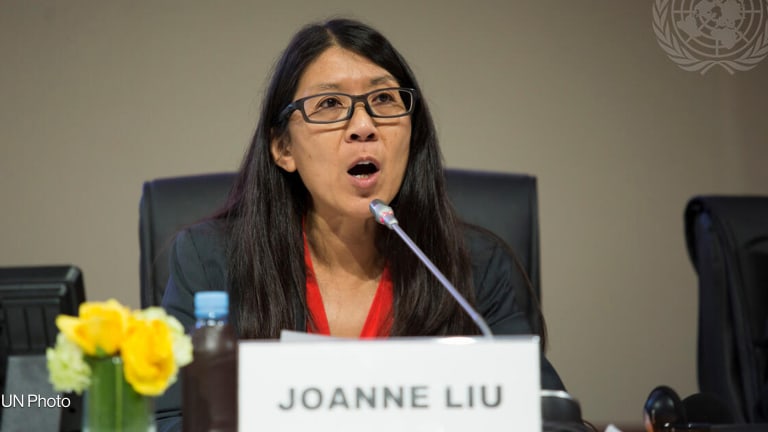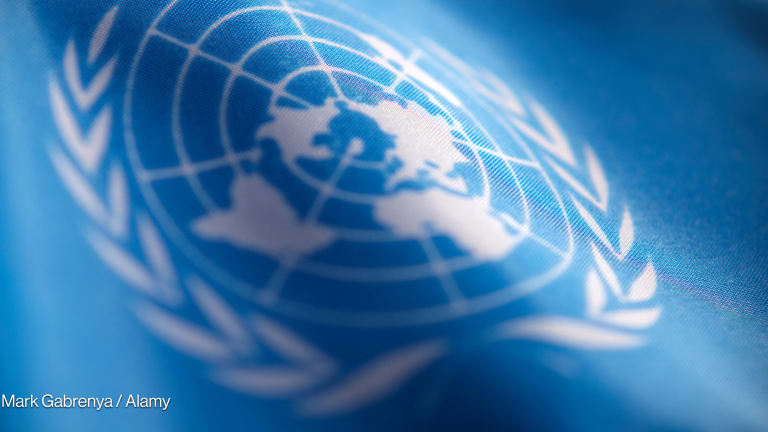
The clock is ticking for Secretary-General António Guterres to appoint the next United Nations relief chief — or, more formally, the undersecretary-general for humanitarian affairs and emergency relief coordinator.
A number of people have been discussed as potential leaders of the Office for the Coordination of Humanitarian Affairs, with two Britons — Nick Dyer and Harriet Matthews — among the top contenders. Other confirmed nominations are Olof Skoog and Koen Davidse, while Joanne Liu and William Chemaly are potential candidates. Devex has learned that Francesco Rocca, Denise Brown, and Martin Griffiths are possible candidates as well.
OCHA has been led by U.K. nationals since 2007. But demands for a “transparent” and “merit-based selection process” are growing louder. Last month, over 50 parliamentarians, civil society leaders, and former diplomats in the U.K. signed an open letter seeking Prime Minister Boris Johnson’s support. His office has not responded publicly.
Mark Lowcock, OCHA’s current head, announced in February that he would be leaving the position. The leadership change comes amid staff complaints about management and as the agency deals with a rising number of humanitarian crises.
Failure to name a Briton to the post would make the United Kingdom the only country among the five permanent members of the Security Council — together known as the P5 — without a leadership role at a major U.N. agency. As the open letter states, “influential Member States, including the UK, have significant sway” in the secretary-general’s decisions. Among top roles, representation from the P5 is “nearly 10 times higher than is proportional,” excluding “a large swathe of global talent,” it says.
“The position needs to be filled by a visionary and an advocate who is also a seasoned diplomat. It’s a difficult role in a difficult time.”
— A senior official specializing in humanitarian affairs“What should be independent decisions are reduced to the playthings of powerful countries,” said Ben Donaldson, head of campaigns at the United Nations Association – UK, the organization that coordinated the letter. “It's hard to believe the U.K. has had the best candidate for the last 15 years.”
In response to questions about the candidates and their selection, the secretary-general’s spokesperson, Stéphane Dujarric, told Devex: “The secretary-general is determined to get the best possible person to lead the Office for the Coordination of Humanitarian Affairs. The selection process is underway.”
The relief chief position is an appointment made by the secretary-general, per U.N. Resolution 46/182. Guterres himself is seeking a largely uncontested second term this year, amid calls for greater transparency in that process as well. His reelection depends mainly on the approval of the Security Council, and the U.K. and China have already given their backing.
Calls for a ‘visionary’
Lowcock took the helm of OCHA in 2017, at a time of turmoil for the agency. Over three years later, he leaves it facing what he recently called the “bleakest and darkest perspective” in terms of humanitarian needs, as conflicts rage around the world, many countries face an imminent threat of famine, and an estimated 1 in 33 people globally need humanitarian aid.
COVID-19 only exacerbates the stresses on the aid model, calling for an increase in fundraising demands during dire economic times. In 2019, OCHA projected a humanitarian funding need of $28.8 billion for 2020, with actual funding reaching $19 billion. In 2021, the projected need is $35.1 billion.
Despite those challenges, 2021 also presents an opportunity to reform the organization, staffers and outside experts say. The new relief chief’s job will demand adroit skills in management, diplomacy, and politics.
“The position needs to be filled by a visionary and an advocate who is also a seasoned diplomat. It’s a difficult role in a difficult time,” said a senior official specializing in humanitarian affairs who requested anonymity in order to speak freely.
“Any candidate would have to merge politics and appease member states with decolonizing aid while bringing greater equality to the system, while preserving humanitarian aid from political interference,” the official added.
Within OCHA, staffers are speaking out — albeit anonymously, to avoid repercussions or retaliation at work. Concerns about a top-down management style and a lack of diversity became public through a Foreign Policy article in the fall. Now, staffers tell Devex they hope a new leader will establish a more diverse management team, hiring people from the global south and more in-country team members for higher positions.
There are also hopes that new leadership will bring a more collegial attitude in incorporating the voices of women and people of color, both in terms of diversifying management teams and expanding who contributes to decision-making.
OCHA staffers speaking anonymously said that coveted positions have usually gone to Western Europeans. Women staffers repeatedly mentioned being “shut out” of career paths, “forced out,” or rendered “voiceless.” Staff members described a top-down decision-making process in which the lead person was not always a seasoned aid professional but rather, as one expert on U.N. politics said, “a political appointment that was part of a larger soft-power agreement between the U.N. and the U.K.”
The candidates
Nick Dyer previously assumed Lowcock’s former position as permanent secretary at the British Department for International Development, which was merged with the Foreign & Commonwealth Office last year to form the Foreign, Commonwealth & Development Office. With him, experts and activists say, OCHA could be perpetuating some of the same leadership issues that have plagued it recently.
Several experts told Devex that an international post could be a reward for Dyer, who was not seen as making noise during the DFID-FCO reorganization and is now the first U.K. special envoy for famine prevention and humanitarian affairs.
Harriet Mathews, career diplomat and civil servant, currently serves as director for Africa at FCDO. While Mathews would not necessarily disconnect OCHA from the many Britons who would precede her as its lead, she does present the chance for Guterres to appoint a woman. The last woman to hold the OCHA position was Valerie Amos, a British politician and diplomat who served from September 2010 until May 2015.
Martin Griffiths, another Briton, has launched a personal campaign for the job, according to five outside experts interviewed for this story. Griffiths has been posted in Yemen since 2018, and he might be looking for a strategic exit. The United States may be interested in backing Griffiths, according to two U.N. experts, but it is uncertain if he will get support from the U.K. While experts repeatedly mentioned Griffiths, he did not respond to any queries about his candidacy.
Rumors around other British candidates are swirling, including the possibility of those from the aid or NGO sectors. Candidates from beyond Britain include:
Olof Skoog, the European Union ambassador to the U.N., was also the Swedish ambassador to the U.N. while Sweden held a seat on the Security Council. Well respected throughout the U.N., Skoog was put forth by the foreign ministers of Denmark, Finland, Iceland, Norway, and Sweden and has since received the backing of Germany. The New Humanitarian reported that in nominating Skoog, the ministers called for “an open, transparent, competitive, and merit-based selection process for the position.”
Koen Davidse, a Dutch national, is an executive director at the World Bank. The Netherlands nominated him in late March. Prior to joining the World Bank, he held a variety of diplomatic and civil service positions. Most recently, he was deputy special representative of the U.N. secretary-general in the Multidimensional Integrated Stabilization Mission in Mali.
2021 will be the 'bleakest and darkest' yet for humanitarian needs
The pandemic has created new, all-time-high requirements for humanitarian response. OCHA announced that it is seeking more than $35 billion to reach 235 million people in need.
Francesco Rocca, an Italian national, is the head of the International Federation of Red Cross and Red Crescent Societies and national president at the Italian Red Cross. Three experts mentioned his candidacy. The Permanent Mission of Italy to the United Nations in New York did not respond to questions, nor did IFRC.
Joanne Liu of Canada was international president at Médecins Sans Frontières until 2019. Currently, she is a member of the Independent Panel for Pandemic Preparedness and Response, an independent group examining international responses to COVID-19.
Denise Brown of Canada is deputy special representative of the United Nations Multidimensional Integrated Stabilization Mission in the Central African Republic. She was previously with the World Food Programme, having served in Afghanistan, Kenya, Somalia, and Senegal, where she worked on WFP’s response to the Ebola outbreak. Brown did not confirm or deny her candidacy.
Asked about the possible candidacies of Liu and Brown, Grantly Franklin, spokesperson at Global Affairs Canada, said, “This transition presents an opportunity for leadership, for fresh perspective, and for progress on diversity and inclusion.” He would not comment on Canada’s support for a candidate.
William Chemaly of Lebanon is a human rights specialist and humanitarian who has worked within OCHA and the UN Refugee Agency. In a LinkedIn post announcing his candidacy, Chemaly wrote that candidates from the global south should be considered, eliciting comments calling for “new perspectives” and to “decolonize” the agency.
Search for articles
Most Read
- 1
- 2
- 3
- 4
- 5








